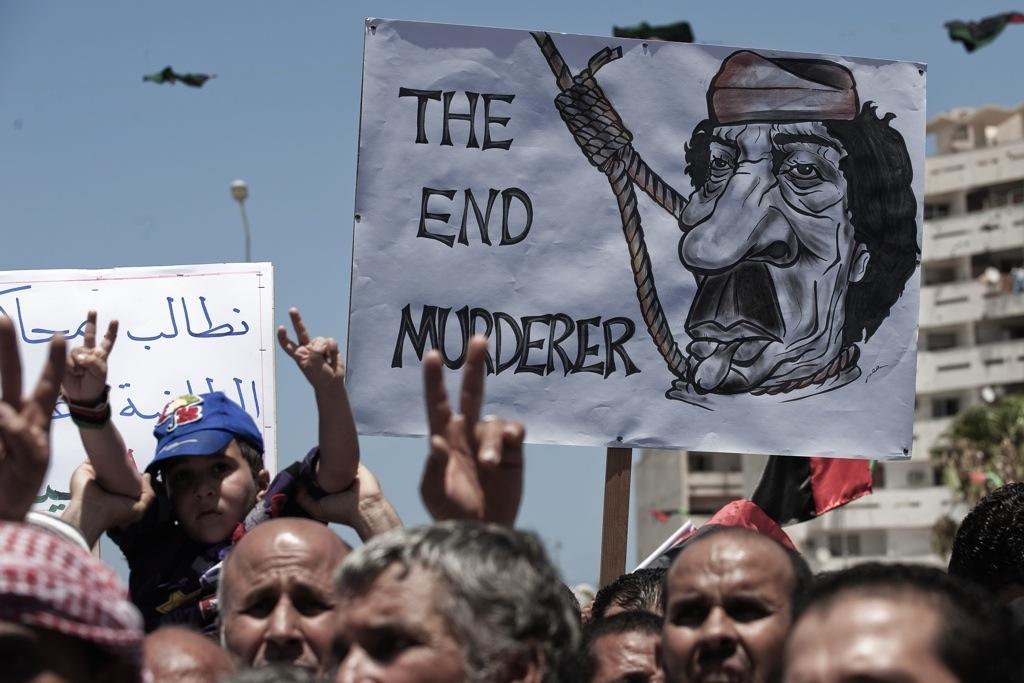Opinion: Gaddafi guilty of war crimes
Thousands of Libyans celebrate in rebel-held Misrata’s Freedom Square after receiving the news that an arrest warrant was issued against Libyan leader Muammar Gaddafi by the International Criminal Court on June 27, 2011.
BOSTON — Colonel Muammar Gaddafi’s four-decade-long regime came to an end this month after rebel forces and NATO air strikes overwhelmed forces defending the Libyan dictator’s compound in Tripoli.
When Libyans first took to the streets to protest Gaddafi’s autocratic rule in February, his response was quick and brutal: attack protesters and target civilians in a deliberate campaign to quash dissent across the country.
As Gaddafi troops closed in on the eastern city of Benghazi and threatened to decimate the population in March, the Arab League called for international intervention. Despite NATO’s subsequent air campaign to protect Libyan civilians, untold thousands have suffered since the uprising began.
More from GlobalPost: Libya: Where are the 50,000 prisoners?
I went to Misrata shortly after rebel forces liberated the city in mid-May. Gaddafi’s forces had relentlessly shelled this strategic port city in western Libya for two months. Most of the fighting took place in the center of the town, and journalists were able to report on the city’s destruction. What they weren’t able to document were the atrocities that Gaddafi’s forces committed in the small villages surrounding Misrata.
"Witness to War Crimes," a report I authored for Physicians for Human Rights, tells that story and shares the experiences of the people of Misrata.
Dr. Katherine Close and I interviewed more than 50 people, and we documented that Gaddafi’s forces used children as human shields to protect them from NATO bombing, disappeared elderly nursing home residents, tortured, raped and executed civilians, attacked hospitals, ambulances, doctors and their patients, and issued orders to starve civilians and block humanitarian aid from entering Misrata.
We are now uncovering a similar pattern of atrocities that Gaddafi’s forces may have committed during their final days in Tripoli: Scores of civilians summarily executed at a makeshift detention facility. Doctors wearing green scrubs found shot and killed. Sick and wounded patients rounded up or left to die in hospitals.
These are war crimes. The question remains, what now must be done?
First, it is critical that civilian authorities led by the Transitional National Council assert full control over Libya and establish the rule of law to prevent further bloodshed, vigilante justice, looting and violence. Second, the international community must assist the newly emerging civilian authorities in providing basic services to the Libyan people. Third, Libya must develop a constitutional framework and build civil society institutions.
Such a difficult process can only succeed in the long term if Libya confronts, without revenge, the legacy of severe human-rights violations committed by Gaddafi’s tyrannical regime. This effort must also examine reports of human-rights violations committed by rebel forces and NATO.
Since Libya does not have developed legal institutions, it is crucial that Libyan transitional authorities fully collaborate with the International Criminal Court, which has already issued arrest warrants for Gaddafi and others. To ensure that war criminals are not placed in future positions of power, Libyan authorities must also develop a screening process. Prosecutions, vetting, and other necessary methods of accountability will guide the Libyan people as they choose how best to forge a secure and just social and political order in the aftermath of the conflict.
More from GlobalPost: Gaddafi's wife and children flee
In view of the latest news on the apparent discovery of mass graves and mass killing sites in Libya, and amidst allegations of human rights violations by various armed actors throughout the months-long conflict, Physicians for Human Rights calls for the immediate protection of all evidence and witnesses so that war crimes can be fully investigated.
Protecting evidence of any and all crime scenes will ensure that independent investigations of alleged war crimes can take place. Without such protection, evidence of past atrocities, as well as those that have occurred during the recent conflict, may be lost, and the people of Libya will be denied a critical opportunity for justice and accountability.
The rule of law must be the bedrock of a new and free Libya.
As the Transitional National Council charts a new course for the country in a post-Gaddafi era, it must ensure that all perpetrators are brought to justice and held accountable for their abuses. Individual accountability for crimes under the rule of law is the best guarantee for preventing future human-rights violations and ending a cycle of violence.
The evidence of war crimes is not merely for the historical record; it is for securing justice and accountability for all Libyans.
Richard Sollom is Deputy Director at Physicians for Human Rights. He currently oversees programs on emergency response, armed conflict, asylum and U.N. advocacy initiatives. Sollom most recently led investigations in Bahrain, Bangladesh, Burma, Libya, Thailand and Zimbabwe.
We want to hear your feedback so we can keep improving our website, theworld.org. Please fill out this quick survey and let us know your thoughts (your answers will be anonymous). Thanks for your time!
